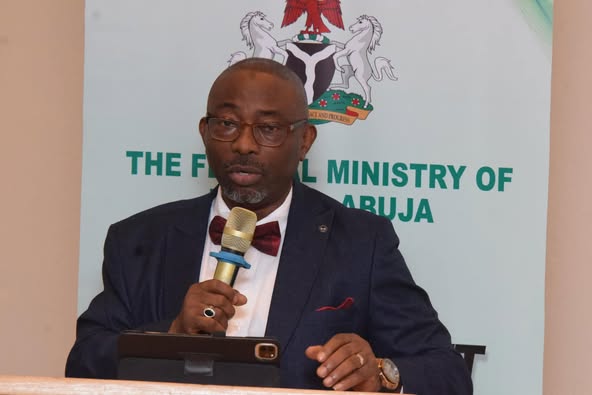The Lagos State Government has warned the National Assembly against proceeding with the proposed Central Gaming Bill, describing the move as unconstitutional and a direct violation of a Supreme Court judgment.
Speaking to journalists on Wednesday at the State Secretariat in Alausa, Ikeja, the Lagos State Attorney General and Commissioner for Justice, Mr. Lawal Pedro, SAN, said the bill threatens Nigeria’s federal structure and risks sparking a constitutional crisis if passed.
The bill, titled “A Bill for an Act to Repeal the National Lottery Act No. 7 of 2005 and the National Lottery (Amendment) Act No. 6 of 2017, and to Enact the Central Gaming Bill,” seeks to centralise the regulation of lotteries, betting, online gaming, and other games of chance across Nigeria.
Pedro strongly opposed the bill, warning that it violates a standing Supreme Court judgment delivered on 13 October 2024 in the case of Attorney General of Lagos State & 22 Others v. Attorney General of the Federation & Others (SC/1/2008).
According to the ruling, the Supreme Court declared that lotteries, betting, and gaming fall under the exclusive legislative power of state governments, not the federal government, except in the Federal Capital Territory.
“Lotteries, betting, gaming, and other games of chance are residual matters falling within the exclusive legislative competence of the states,” Pedro quoted from the judgment.
He explained that the National Lottery Act of 2005, which previously centralised lottery regulation, had already been declared unconstitutional by the Supreme Court, and any attempt to revive similar provisions under a new name was illegal.
“Once the Supreme Court has spoken on a constitutional issue, its decision is final and binding on all persons and authorities, including the Executive and the Legislature,” he said.
Pedro warned that if the Senate proceeds to give concurrence to the bill, which has already passed through the House of Representatives, states may have no choice but to return to the Supreme Court to protect their constitutional rights.
“This is not just a Lagos matter. It concerns all the 22 states that joined in the original suit. The Supreme Court judgment restrains the Federal Government from regulating gaming and lotteries in the states.”
He added that the only way to reverse the court’s decision is through a constitutional amendment, not a new law from the National Assembly.
Addressing claims that the proposed law only targets online and remote gaming, Pedro dismissed the argument, saying that digital platforms do not change the legal nature of the activity.
“Does ‘online’ make it federal? Whether a ticket is sold in a shop or through a mobile app, it remains a game of chance within the state’s jurisdiction,” he said.
He warned that if the bill is passed, it would undermine Nigeria’s federal structure, breach the separation of powers, and disregard the rule of law.
“The Senate should reject concurrence with this Bill in the interest of federalism, constitutionalism, and national stability,” he urged.
Pedro reaffirmed the commitment of Lagos State and the other 22 plaintiff states to defending the principles of federalism and upholding the powers granted to states under the 1999 Constitution.
“The strength of our democracy lies not in the might of any arm of government but in our collective respect for the rule of law,” he said.
“This issue is about safeguarding the integrity of the Supreme Court and preserving Nigeria’s federal system.”
The Attorney General also reminded lawmakers that Nigeria is a federation, not a unitary state, and that each level of government must operate within the limits of its constitutional powers.
The Central Gaming Bill, if passed, would replace existing laws regulating lotteries and gaming under a federal structure, handing control of the industry to the National Lottery Regulatory Commission (NLRC).
Supporters of the bill argue it will improve regulation and increase federal revenue, especially from online betting and gambling. But critics say it undermines the constitutional rights of states and violates binding judicial precedent.
The matter now rests with the Senate, which must decide whether to give final approval to the controversial bill.

